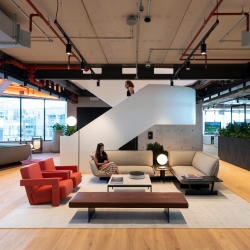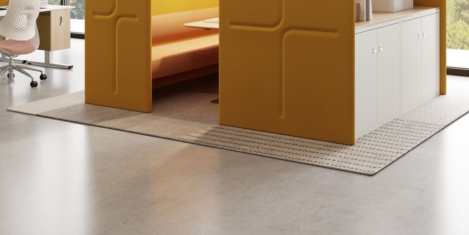June 8, 2021
Search Results for: office
June 7, 2021
The bullshit jobs theory may turn out to be, well…
by Neil Franklin • News, Wellbeing, Working culture

The so-called ‘bullshit jobs theory’ – which argues that a large and rapidly increasing number of workers are undertaking jobs that they themselves recognise as being useless and of no social value – contains several major flaws, argue researchers from the universities of Cambridge and Birmingham. Even so, writing in Work, Employment and Society, the academics applaud its proponent, American anthropologist David Graeber, who died in September 2020, for highlighting the link between a sense of purpose in one’s job and psychological wellbeing.
June 3, 2021
Engineered familiarity in the new era of work
by Robin Bayliss • Comment, Working lives, Workplace design
 Every day, after a leisurely breakfast in bed and the opening of his post, Roald Dahl would wander down his garden to the grubby little hut crammed with personal paraphernalia he had created there. There he would sharpen the six yellow pencils that were always by his side while he worked, settle into an armchair, put his feet up on an old suitcase filled with logs, place an American yellow legal pad of paper onto a makeshift board on his lap and work for two hours. (more…)
Every day, after a leisurely breakfast in bed and the opening of his post, Roald Dahl would wander down his garden to the grubby little hut crammed with personal paraphernalia he had created there. There he would sharpen the six yellow pencils that were always by his side while he worked, settle into an armchair, put his feet up on an old suitcase filled with logs, place an American yellow legal pad of paper onto a makeshift board on his lap and work for two hours. (more…)
June 3, 2021
Half of businesses have provided support for workers’ mental health during the pandemic
by Neil Franklin • Comment, News
 Half of workers in the UK (50 percent) say their employers have provided support for their mental health during the COVID-19 pandemic, while two-thirds of employees globally reported the same (65 percent). This may illustrate a growing awareness and concern from businesses about the potential psychological impact on staff, according to a new study People at Work 2021: A Global Workforce View by the ADP Research Institute. (more…)
Half of workers in the UK (50 percent) say their employers have provided support for their mental health during the COVID-19 pandemic, while two-thirds of employees globally reported the same (65 percent). This may illustrate a growing awareness and concern from businesses about the potential psychological impact on staff, according to a new study People at Work 2021: A Global Workforce View by the ADP Research Institute. (more…)
June 1, 2021
Real Estate, HR and Technology leaders must collaborate to create a future of work fit for the 21st Century
by Philip Nye • Comment, Property, Technology, Workplace, Workplace design
 HR leaders, heads of real estate and IT decision-makers have not always spent huge amounts of time working together – their roles and responsibilities have often been siloed. But in the new world of work, that’s all changing. These three groups of senior leaders are being asked to collaborate on one of the biggest challenges corporate occupiers, as they try to figure out when and how to return to office-based working and shape the future of work. Failure to collaborate will increase the probability of workplaces having low occupancy rates, low employee engagement and decreased productivity. (more…)
HR leaders, heads of real estate and IT decision-makers have not always spent huge amounts of time working together – their roles and responsibilities have often been siloed. But in the new world of work, that’s all changing. These three groups of senior leaders are being asked to collaborate on one of the biggest challenges corporate occupiers, as they try to figure out when and how to return to office-based working and shape the future of work. Failure to collaborate will increase the probability of workplaces having low occupancy rates, low employee engagement and decreased productivity. (more…)
May 27, 2021
For a workplace culture to flourish, sometimes you have to let go
by Cathy Hayward • Comment, Flexible working, Wellbeing, Workplace design
 Ten years ago, the day after I left my full-time job at FM World magazine* to set up Magenta I wrote a blog called In Defence of the Office about how people feel when they’re asked to work flexibly. I talked about how many people struggle, finding that without the structure of day-to-day office life, they can’t manage their time properly, can’t discipline themselves to work and get distracted by domestic life. And they find, because perhaps they haven’t got to grips with the new technology, that they can’t locate important files or connect to that key person. They find that without the workplace they can’t work – or at least not as well. (more…)
Ten years ago, the day after I left my full-time job at FM World magazine* to set up Magenta I wrote a blog called In Defence of the Office about how people feel when they’re asked to work flexibly. I talked about how many people struggle, finding that without the structure of day-to-day office life, they can’t manage their time properly, can’t discipline themselves to work and get distracted by domestic life. And they find, because perhaps they haven’t got to grips with the new technology, that they can’t locate important files or connect to that key person. They find that without the workplace they can’t work – or at least not as well. (more…)
May 27, 2021
A warning to employers that hybrid working will disproportionately impact their younger workforce
by Jayne Smith • Flexible working, News, Working lives
 As the UK lockdown eases and the nation slowly returns to the office, energyhelpline.com has conducted research into the cost of hybrid working. With the nation settling into a mix between office and home-based working, workers are expecting to pay out £890 a month on various work-related expenditure, with outgoings such as travel, after work socialising and rising energy bills set to ramp up monthly expenses. (more…)
As the UK lockdown eases and the nation slowly returns to the office, energyhelpline.com has conducted research into the cost of hybrid working. With the nation settling into a mix between office and home-based working, workers are expecting to pay out £890 a month on various work-related expenditure, with outgoings such as travel, after work socialising and rising energy bills set to ramp up monthly expenses. (more…)
May 26, 2021
Time to take stock about the future of the workplace
by Neil Franklin • Company news, Workplace design
 When it comes to conversations about work and workplaces, the past year has offered a fully immersive experience. Everybody now has an opinion. Inevitably some of them are better informed and more rooted in experience than others. So, after a full year of talk and as we return to some form of routine working life, the time has come to take stock. Few organisations and people will remain untouched by the sudden shift in attitudes towards working life, so we asked four workplace experts for their views on the current state of play. (more…)
When it comes to conversations about work and workplaces, the past year has offered a fully immersive experience. Everybody now has an opinion. Inevitably some of them are better informed and more rooted in experience than others. So, after a full year of talk and as we return to some form of routine working life, the time has come to take stock. Few organisations and people will remain untouched by the sudden shift in attitudes towards working life, so we asked four workplace experts for their views on the current state of play. (more…)
May 25, 2021
The power of nudge: How behavioural science and AI can improve workplace wellbeing
by Richard Gregory • Comment, Technology
 When the global pandemic struck last year, many companies were forced to close offices and enable employees to work remotely – bringing forward their digital transformation roadmap by a good few year. A year on, and while it seems that the Covid-19 restrictions are reducing, there is unlikely to be a complete shift back to the office. Instead, most companies are now planning to adopt a hybrid work model; with employees working a mix of in-office or remotely. (more…)
When the global pandemic struck last year, many companies were forced to close offices and enable employees to work remotely – bringing forward their digital transformation roadmap by a good few year. A year on, and while it seems that the Covid-19 restrictions are reducing, there is unlikely to be a complete shift back to the office. Instead, most companies are now planning to adopt a hybrid work model; with employees working a mix of in-office or remotely. (more…)
















 Research from
Research from 












June 4, 2021
Expect to see a growing number of people with the job title Head of Remote
by Jo Deal • Comment, Flexible working